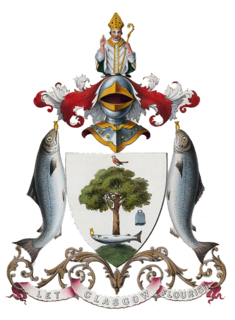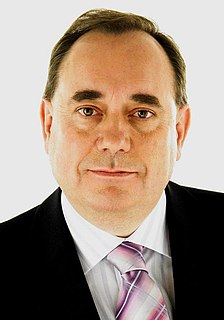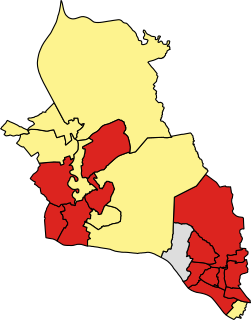
East Dunbartonshire is one of the 32 council areas of Scotland. It borders the north-west of the City of Glasgow and contains many of the suburbs of Glasgow as well as many of the city's commuter towns and villages. East Dunbartonshire also shares borders with North Lanarkshire, Stirling and West Dunbartonshire. The council area covers parts of the historic counties of Dunbartonshire, Lanarkshire and Stirlingshire.

Glasgow City Council, the local government body of the city of Glasgow, Scotland, became one of the newly created single tier local authorities in 1996, under the Local Government etc. (Scotland) Act 1994, with boundaries somewhat different from those of the City of Glasgow district of the Strathclyde region: parts of the Cambuslang and Halfway and Rutherglen and Fernhill areas were transferred from the city area to the new South Lanarkshire council area.
Local government in Scotland is organised through 32 unitary authorities designated as councils which consist of councillors elected every five years by registered voters in each of the council areas.

East Dunbartonshire is a county constituency of the House of Commons of the Parliament of the United Kingdom (Westminster). It elects one Member of Parliament (MP) by the first past the post system of election. The current MP for East Dunbartonshire is Jo Swinson.

West Dunbartonshire is a county constituency of the House of Commons of the Parliament of the United Kingdom (Westminster). It elects one Member of Parliament (MP) by the first past the post system of election and covers the same area as the county of West Dunbartonshire.
Scotland has elections to several bodies: the Scottish Parliament, the United Kingdom Parliament, the European Parliament, local councils and community councils.
The East Dunbartonshire Independent Alliance was a minor political party operating in East Dunbartonshire, Scotland, represented on East Dunbartonshire Council until October 2012 by Jack Young, one of the three councillors for Kirkintilloch East & Twechar, and until July 2012 by Charles Kennedy, one of the three councillors for Campsie & Kirkintilloch North.
Elections to West Dunbartonshire Council were held on 3 May 2007, the same day as the other Scottish local government elections and the Scottish Parliament general election. The election was the first one using six new wards created as a results of the Local Governance (Scotland) Act 2004, each ward will elect three or four councillors using the single transferable vote system a form of proportional representation. The new wards replace 22 single-member wards which used the plurality system of election.
Elections to East Dunbartonshire Council were held on 3 May 2007, the same day as the other Scottish local government elections and the Scottish Parliament general election. The election was the first one using 8 new wards created as a results of the Local Governance (Scotland) Act 2004 each ward will elect three councillors using the single transferable vote system a form of proportional representation. The new wards replace 24 single-member wards which used the plurality system of election.

The 2012 Scottish local elections, were held on 3 May, in all 32 local authorities. The Scottish National Party (SNP) overtook Labour to win the highest share of the vote, and retained and strengthened its position as the party with most councillors. Labour also made gains, while the Liberal Democrats experienced meltdown, falling behind the Conservatives. For the first time since the introduction of the Single Transferable Vote system, the SNP won majority control of 2 councils, from no overall control. Labour also won majority control of 2 councils from no overall control, while retaining majority control over 2 councils.
This page documents political party strengths in the United Kingdom's principal local authorities. The last major change to council compositions was the 3 May 2018 local elections, but changes in party representation arise frequently due to resignations, deaths, by-elections, co-options and changes of affiliation.

The Scottish local elections, 2003 were held on 1 May 2003, the same day as Scottish Parliament elections and local elections in parts of England. All 32 Scottish councils had all their seats up for election – all Scottish councils are unitary authorities.

Elections to West Dunbartonshire Council were held on 3 May 2012 on the same day as the 31 other local authorities in Scotland. The election used the six wards created under the Local Governance (Scotland) Act 2004, with 22 Councillors being elected. Each ward elected either 3 or 4 members, using the STV electoral system.
Elections to East Dunbartonshire Council were held on 3 May 2012, the same day as the 31 other local authorities in Scotland. The election used the eight wards created under the Local Governance (Scotland) Act 2004, with 24 Councillors being elected. Each ward elected either 3 or 4 members, using the STV electoral system.

The 1995 elections to West Dunbartonshire Council were held on the 6 April 1995 and were the first for the newly formed unitary authority, which was created under the Local Government etc (Scotland) Act 1994 and replaced the previous two-tier system of local government under Strathclyde Regional Council and Dumbarton and Clydebank District Councils.
The 1999 elections to West Dunbartonshire Council were held on the 6 May 1999 and were the second to the unitary authority, which was created, along with 28 other local authorities, under the Local Government etc (Scotland) Act 1994.
The next Elections to West Dunbartonshire Council will be held on Thursday 4 May 2017, on the same day as the 31 other local authorities in Scotland. It will be the third successive Local Council election to run under the STV Electoral System. The election will use the six wards created under the Local Governance (Scotland) Act 2004, with 22 Councillors being elected. Each ward will elect either 3 or 4 members, using the STV electoral system.
Elections to Bearsden and Milngavie Council were held in May 1992, the same day as the other Scottish local government elections. The election was the last for the Bearsden and Milngavie District Council, as the council would be combined into the East Dunbartonshire unitary authority for the 1995 election.
Elections to East Dunbartonshire Council were held on Thursday 4 May, the same day as the 31 other local authorities in Scotland. The election used seven wards created under the Local Governance (Scotland) Act 2004, a reduction of one from 2012, with 22 Councillors being elected, 2 fewer overall. Each ward elected either 3 or 4 members, using the STV electoral system.







